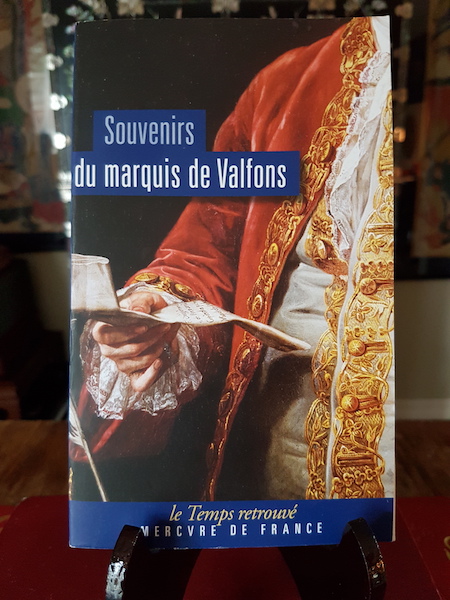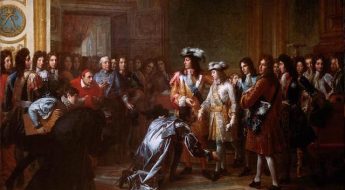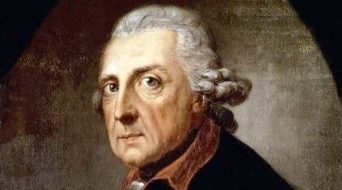Frederick II (1712-1786) of Prussia, called the Great, was avowedly francophile. Raised by a French governess and always more comfortable speaking French than German, he read and wrote almost exclusively in the language of Molière. It’s perhaps surprising, therefore, to realize that he only ever set foot in France once in his long life.
In August of 1740, a few months after his accession to the throne, he went on a tour of his Rhenish possessions, tantalizingly close to the French frontier. He couldn’t resist slipping into Strasbourg incognito. Not only was Strasbourg a French city, it was a garrison town, thus allowing Frederick to combine business with pleasure: he could visit the fabled country of which he’d heard so much and at the same time gather military intelligence. Fortunately for us, a young French officer who encountered the King left an eyewitness account of this unofficial visit in his memoirs. More fortunately still, I picked up a copy of the newly issued edition of these memoirs, Souvenirs du Marquis de Valfons, in the bookshop at Versailles on my visit there in late March, 2016.

I had never heard of this Valfons before. Born in 1710, he served in Louis XV’s army for several decades. Apparently very handsome, he also cut a swathe through the court and high society in Paris. In 1740, he was serving in the Piedmont regiment, which at that time was stationed in Strasbourg. As far as I can make out, his memoirs have never been published in English. What follows, therefore, is my own translation of the pages about Frederick’s brief sojourn in Strasbourg.
“It was at this time, at a famous inn in Strasbourg called The Raven, that I was playing cards with Mme de Schomberg, who was on her way from Paris to Saxony, to an estate she possessed near Dresden. I had been used to seeing her in company in Paris since my earliest youth. Three strangers from Germany were announced: one was called the Count Dufour. Approaching very politely, the latter said, ‘Madame, although I have never had the honour of making your acquaintance, I know your name too well not to pay my respects. I’ve just come from Bohemia; at Nuremberg I met these gentlemen, with whom I’m traveling.’
Mme de Schomberg, in response to these civilities, offered them chairs. We stopped playing. Beginning to chat, Count Dufour spoke with wit and vivacity, and above all with such facility in using French expressions that there was nothing of the foreigner about him. He sneezed, and as soon as he did, his two travel companions jumped up assiduously and with a very respectful air. He could not help smiling, and signaled them with his hand to sit down again, which gave me pause, and I began to put my questions with greater reserve. A moment later, Thech, the innkeeper, passing behind me, said, ‘Sir, this Count Dufour is the Prince Royal of Prussia*, who is traveling incognito with two of his courtiers.’
Then I understood the enigma of the respectful attitude I had just observed. The count asked me to sup with him; I was engaged with Mme de Schomberg, who very politely invited him to share our meal. I asked him if he intended to stay to see something of Strasbourg, offering myself as a guide, and I invited him to dinner the next day, which he accepted.
On arriving, he had sent to ask if there were any officers of the garrison at the café. As chance would have it, Coincy** and two others, having partaken of a long lunch, were taking coffee. They believed that it was some new arrival looking for company. Still slightly the worse for wine, they took up the offer of the adventure and followed the innkeeper’s boy, who led them in to Mme de Schomberg’s table, where they were very surprised to see me. Count Dufour got up, and, taking leave of Mme de Schomberg, said to these gentlemen, ‘I am flattered by your obligingness, and I beg you to continue it by joining me upstairs for supper.’
I caught up to Coincy at the staircase and said to him, ‘Take care: I’m told that this so-called Count Dufour is the Prince Royal of Prussia.’
Their supper was very amusing. The count never stopped putting questions to Coincy, who was better placed to answer than his comrades because he was a major. On getting up from the table, it was agreed that they would all go to see the guards on parade the next morning, and then on to inspect the linen and other togs of the two Piedmont battalions***.”
*Valfons perhaps misremembered the timing. This was August, and Frederick had already been king since the end of May.
**One of Valfons’ brother officers.
***Frederick famously took a minute interest in everything to do with the kitting out and provisioning of armies.
This is not the end of the young marquis’s account of Frederick’s visit. Although it’s off to a good start, the visit turns sour. Be sure to check back in a few days for the next instalment!

















Leave a Comment